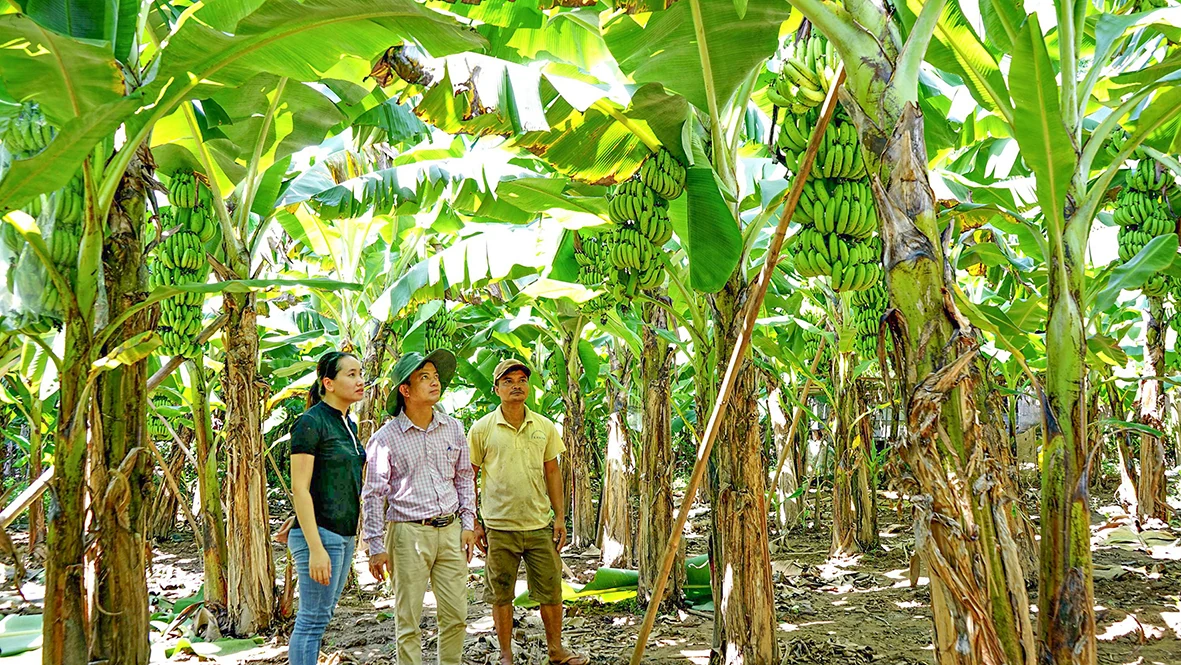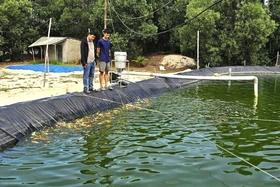{title}
{publish}
{head}
In recent years, Dakrong District has focused on effectively implementing production support policies and national target programs to support economic development among ethnic minority communities. These efforts have generated significant resources and motivation to boost economic growth in mountainous areas and ethnic minority regions alike.

The model of cultivating pink banana using tissue-cultured seedlings in A Ngo commune, Dakrong district, has provided farmers with a high income. Photo: L.A
Dakrong is a mountainous border district consisting of 13 administrative units, including 11 communes and towns in Area III and one commune in Area II, designated as ethnic minority and mountainous regions for the 2021-2025 period. The district has over 12,000 households, with a population of approximately 46,800. Ethnic minority households make up 78.6% of the population, predominantly consisting of Van Kieu and Pa Ko communities.
To enhance the livelihoods of ethnic communities, Dakrong District has actively implemented state investment policies, providing support for crop and livestock development, production tools, vocational training, and overseas work opportunities. According to Le Dai Loi, Vice Chairman of Dakrong District People’s Committee, from 2019 to 2024, the district’s total social investment reached over US$65 million, primarily focusing on building infrastructure such as rural transportation, irrigation, water supply, electricity, schools, health stations, and training projects for local officials and residents. This development has driven economic and social growth, significantly improving the lives of the local population.
With various funding sources, the district has constructed a new embankment for riverbank protection and upgraded 15 additional infrastructure projects. Dakrong now boasts 57 irrigation systems, actively watering 490 hectares of double-crop rice land, with the concreting rate increasing from 95.3% in 2019 to 96.1% in 2024. This development has effectively supported agricultural production and structural shifts in crop selection, with 12 communes meeting new rural criteria for irrigation.
Annual improvements and repairs to water supply facilities have provided residents with reliable access to clean water. Currently, the district has 68 water supply systems managed by commune authorities and village boards, increasing the rate of rural households with access to clean water from 84.04% in 2019 to 88.01% in 2024.
Dakrong has guided specialized agencies and localities to develop crops and livestock suited to regional conditions and local farming practices. Intensive farming, crop rotation, new crop varieties, and mechanization have been introduced to improve productivity and efficiency.
Forest management, afforestation, forest protection contracts, and wildfire prevention have also been prioritized, resulting in 5,832 hectares of concentrated forest and 250,000 scattered trees planted, bringing forest coverage to 65.59%.
In addition, Dakrong has integrated various national target programs (NTPs), including those for sustainable poverty reduction, new rural construction, and socio-economic development in ethnic and mountainous areas, along with various projects and preferential credit funds. Between 2019 and 2024, over $1.7 million was allocated to production development, and over $10.3 million was invested in infrastructure for 176 projects, building more than 900 houses, and holding 19 training sessions for approximately 800 officials, village leaders, and community representatives. Job creation efforts benefitted 5,278 workers, including 209 in overseas contract work.
Furthermore, 1,766 rural workers received vocational training, including 1,427 in agriculture and 349 in non-agricultural fields. By the end of 2023, the trained workforce rate reached 76.5%, with 34.73% holding formal certifications. The district also provided support for 65 households in need of land, 469 households with housing needs, 715 households requiring dispersed water access, and 126 households needing job transition due to a lack of productive land. Seven centralized water systems were upgraded, and 51 households in Ta Rut commune were resettled in place, while concentrated resettlement was arranged for three communes.
More than 12,900 households accessed preferential credit funds through the district’s Social Policy Bank, with disbursements totaling over $26 million. The results of these programs and projects have positively transformed the district, creating and expanding economic models and improving the quality of life.
As of 2023, the average income reached $1,400 per person annually, and the poverty rate decreased by more than 5% each year based on multidimensional poverty standards. Infrastructure upgrades have been widespread, with 100% of commune and inter-commune roads now paved, and rural transport systems reinforced. All communes and towns, as well as 99.35% of households, now have access to the national grid.
Vice Chairman of Dakrong People’s Committee Le Dai Loi shared that Dakrong will continue to prioritize the effective implementation of national target programs in the coming period, focusing on planning and investing in production models, selecting suitable crops and livestock, and developing economic models linked to market demands.
The district also plans to strengthen vocational training, create employment opportunities, and promote self-sufficiency among ethnic communities to reduce poverty. These efforts aim to improve and diversify livelihoods for residents, narrowing income disparities between ethnic and mountainous regions and more developed areas in the province.
With the active involvement of the entire political system, the National Target Program (NTP) for socio-economic development in ethnic minority and mountainous areas (EMMAs) in Quang Tri province has achieved significant initial results in its first phase from 2021 to 2025. This program has led to improved material and spiritual living conditions for people in ethnic minority communities, with infrastructure development gradually becoming more synchronized and effective, thereby transforming the rural landscape of the region.
To ensure the success of the NTP for socio-economic development in EMMAs from 2021 to 2025, the Quang Tri Provincial People’s Committee has promptly issued directives and assigned specific tasks to various levels and sectors. These entities are responsible for closely monitoring the implementation and translating it into concrete goals and content while developing operational plans with clearly defined responsibilities for agencies, units, and localities.
The program promotes decentralized management, empowering localities, communities, and citizens to carry out the initiatives effectively. At the beginning of each year, the units independently coordinate with assigned agencies to implement specific content, sub-projects, and projects, as well as monitor and evaluate plans for the year.
Ho Thi Le Ha, Head of the Provincial Ethnic Affairs Department, stated, "The process of monitoring and evaluating the program involves close collaboration among provincial departments and sectors to understand the situation, promptly address challenges, and propose solutions. The work of information dissemination and advocacy for the program has been prioritized by various levels and sectors using diverse and suitable methods for different audiences. This has contributed to raising awareness and responsibility among public officials, employees, citizens, businesses, and society regarding the program’s significance, meeting the needs and aspirations of the people, who are eager to participate."
Le An - Ngoc Mai

QTO - In Quang Tri, clean agricultural stores may not flaunt flashy signs or wide storefronts, but they are quietly becoming trusted places where consumers...

QTO - In a quiet village in central Vietnam, Le Minh Duc, 26, has turned his passion for ornamental fish into a promising startup, the first Koi breeding...